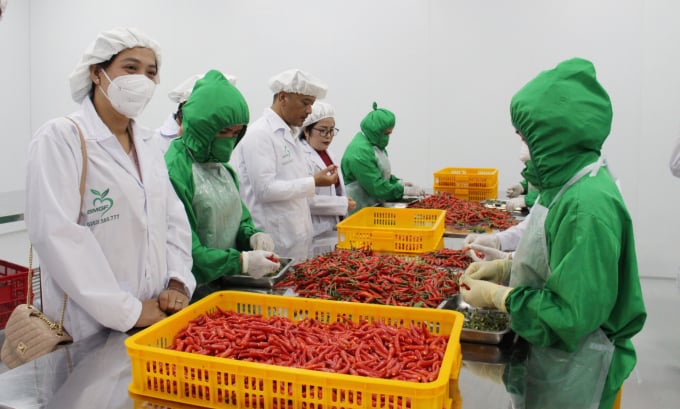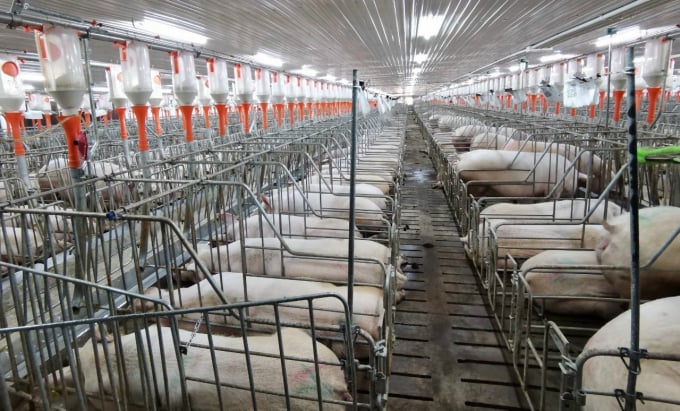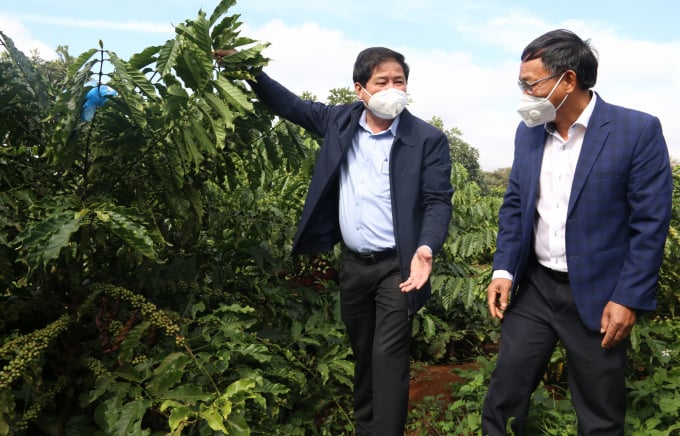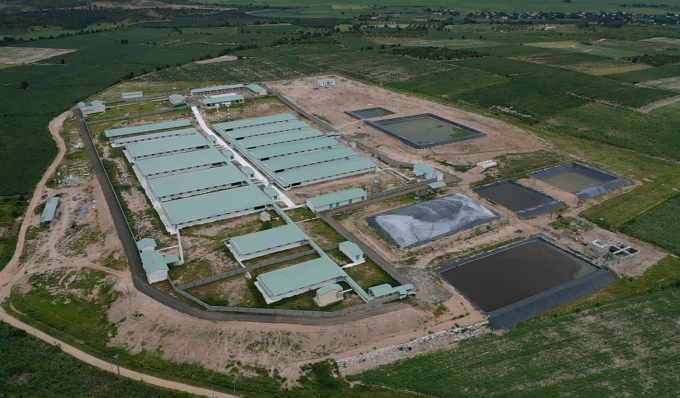June 1, 2025 | 21:32 GMT +7
June 1, 2025 | 21:32 GMT +7
Hotline: 0913.378.918
June 1, 2025 | 21:32 GMT +7
Hotline: 0913.378.918
Dak Lak is an exchange center, a gateway and focal point for commercial trade and cooperation in the developing triangle area of Vietnam, Laos, and Cambodia. The province is chosen to be planned to develop into a political-socio-economic hub of the Central Highlands and is home to various regional-level government institutions.
Dak Lak leads the country with 650,000 ha of agricultural production land; over 60 percent of the populace depending on agriculture is huge manpower; the region boasts a flat terrain, in which nearly 300,000 ha of the rich basaltic red soil, which is considered the best agricultural soil, a temperate climate with nearly 42,000 ha of water surface. Several agricultural goods of Dak Lak have top area, output, and quality in the country such as coffee, pepper, cocoa, macadamia, fruits, honey, and cold-water fish among others.
Over the previous period, agriculture has documented the close attention and directives of all levels to conduct agricultural restructuring and create new rural areas in the province and the overall industry from the very first days of the year.

An employee of Ban Me Green Farm Joint Stock Company is processing chili peppers for export to the Japanese market. Photo: Quang Yen.
Agricultural production in 2021 still grew stably during the complexity of the Covid-19 pandemic; the combined targets of the industry reached and surpassed the plan, especially the agro-forestry-fishery Gross-Value-Product value increased 3.75 percent in the 2010 year on year (1.33 times higher than the national average) (1.33 times higher than the national average). Which, agro-forestry-fishery still represented a critical part of the provincial economic structure.
Agricultural restructuring is done synchronously in all sectors, investing scientific technology appliances into production, notably high-tech; irrigation system is enhanced and developed in the direction of multipurpose… Management officials and experts in agricultural and rural development have experience, are proactive, passionate, and strong attachment to the task, continually making attempts to over the difficulty and fulfill the assignments.
However, the province faces several hurdles such as the increasing price of input production materials, while the selling prices are low; drought, floods, and diseases on plants and livestock, especially the impacts of the Covid-19 pandemic have lowered the selling prices of some main force agricultural products and the consumption power that have greatly affected the production, income and the living of people and enterprises.
The application of scientific and technical advances to production has not been synchronized, lack of funds for implementation and focus on preservation, deep processing, low added value; The restructuring of crops is still fragmented, agricultural products are still scattered, and small, large-scale concentrated production areas have not yet been established, and key products bearing local typical brands are still limited quantity and quality, low competitiveness.

Dak Lak has attracted many high-tech pig farms in recent years. Photo: Quang Yen.
Agricultural reform has been poor and asynchronous in many places. There are several impediments to firms investing in agriculture in general. The number of investment projects is low, the scale is modest, and the potential is unmatched.
Infrastructure is yet to develop in a comprehensive and modern manner to meet the needs of agriculture. Numerous constraints and deficiencies exist in the management of seeds, fertilizer, pesticides, animal feeds, and fisheries feeds. Numerous major industrial items have still to be included into the overall framework...
According to Mr. Vu Duc Con, deputy director of the Dak Lak Department of Agriculture and Rural Development, the province has enacted nine programs aimed at restructuring agriculture.
In which Dak Lak regards chain production as an inevitable direction; defining clearly the primary force products based on each region's strengths; coordinating production along the value chain; promoting production organization reform in the direction of cooperation, linkage, and development of cooperatives and cooperation groups; utilizing advanced technologies; creating products with high volume, synchronous quality, and prestigious branding.

Deputy Minister of Agriculture and Rural Development Le Quoc Doanh and Mr. Vu Duc Con - Deputy Director of Dak Lak Department of Agriculture and Rural Development (right) inspect high-quality coffee varieties at the Central Highlands Agro-Forestry Science Institute. Photo: Quang Yen.
Dak Lak is particularly focused on developing and manufacturing OCOP products. Defining coffee as a commodities business with a high economic value; concentrating efforts on promoting the Buon Me Thuot coffee brand name, producing specialty coffee, and orienting toward the target "Dak Lak is a coffee destination in the world." Gradually modifying the structure of export commodities in line with the increase in the number of deep-processing goods, while decreasing the amount of preliminary processing and raw exports.
Additionally, the neighborhood draws high-potential firms in agricultural and rural areas, particularly in preservation, processing, and agro-forestry-fishery commerce, as well as logistics. Developing circular economic models for agriculture, so establishing a more stable, sustainable, and effective connection between agricultural consumers and farmers. Implementing synchronized solutions to attract investment in processing and preservation technologies; bolstering exports, particularly for primary commodities and those with inherent strength.
The locality implements digital transformation in agriculture, proposes the establishment of a legal corridor, develops an industry-wide database system, digitizes agricultural product value chain processes, and connects economic sectors synchronously, thereby providing a catalyst for synchronous and effective digital transformation in agriculture. Simultaneously, emphasis on training human resources for digital transformation, particularly in remote, isolated, and ethnic minority areas; implementing and utilizing proven digital transformation software and application models to boost economic efficiency and safeguard the environment.
Continue to effectively implement the National Target Program on new rural areas in the direction of in-depth, practical, effective, and sustainable development, reducing regional disparities by focusing on rural residents, production, and people's increasing and stable income; promote advanced new rural areas, model-new rural areas, and new rural construction at the village level.
According to Mr. Vu Duc Con, Dak Lak province has been aggressively advising, calling on, and attracting enterprises to engage in the agriculture industry in recent years. Investing in the development of processing factories to purchase items for the people, in particular, is a beneficial way to address the issue of excess products for the people.

A well-invested pig farm in Buon Don district. Photo: Quang Yen.
Numerous investors have come to the province to invest in livestock and large agricultural product processing, including Sapo Company, which invested in a fruit, vegetable, and vegetable processing factory; Hung Nhon Group, which invested in a pig raising project; and Xuan Thien Group, which invested in a hi-tech agricultural park in Cu Mgar district...
From 2010 to the present, the Provincial People's Committee on Investment Policies has authorized 73 investment projects in the agricultural sector, comprising 15 projects in crop production, 11 projects in animal husbandry, 21 projects in crop production, and 21 projects in livestock production, 2 projects in the field of high technology, and 2 and 4 projects in the field of agro-forestry product processing.
At the moment, 33 projects are being prepared for submission to the Provincial People's Committee for approval, including ten in the livestock sector, fifteen in the forestry sector, one in the high-tech sector, and seven in the field of agricultural and forestry product processing.
Mr. Y Giang Gry Nie Knong, Vice Chairman of Dak Lak province's People's Committee, recently urged that the Central Government adopt measures to address the problem of depleted and poor forests controlled by corporations and agro-forestry agencies in the province that cannot be converted. Certain enterprises venture into Dak Lak but have numerous difficulties with agricultural and forestry land.
Dak Lak thus requested that the Ministry of Agriculture and Rural Development submit the forestry plans to the Prime Minister for approval as soon as possible. Dak Lak anticipates that corporations, scientists, and local governments will collaborate to establish a chain of linkages connecting production, processing, and consumption. To minimize investment in manufacturing, consequently increasing the value and quality of life of people.
Translated by Linh Linh

(VAN) Seafood by-products are opening a new path, combining green growth and technological innovation to enhance the industry's value.

(VAN) Mr. Nguyen Thanh Cong, Vice Chairman of the Son La Provincial People's Committee, reflects on Son La’s journey from barren hills to fruitful orchards after a decade of hard work.

(VAN) FAO’s Director-General addresses the 5th Baghdad International Water Conference.
/2025/05/26/1716-4-nongnghiep-191706.jpg)
(VAN) Chain linkages, technological innovation, and raw material zoning are three strategic pillars for the coconut industry to strongly develop and elevate its position on the global agricultural map.
![Advanced mariculture – an inevitable trend: [4] Accompanied by scientists](https://t.ex-cdn.com/nongnghiepmoitruong.vn/608w/files/sohk/2025/05/13/1941-pgsts-vo-van-nha-140958_717.jpg)
(VAN) According to Assoc. Prof. Dr. Vo Van Nha, Director of the RIA III, the development of advanced offshore mariculture is no longer an option but an essential path for Vietnam’s fisheries sector.

(VAN) Vietnam is intensifying the development of mollusk farming areas that meet international standards, aiming for sustainable growth and enhancing its export position in the global seafood market.
![Advanced mariculture – an inevitable trend: [3] Policy-driven momentum](https://t.ex-cdn.com/nongnghiepmoitruong.vn/608w/files/doanhtq/2025/05/21/0104-0616-0348-nuoi-bien-170339_789.jpg)
(VAN) To ensure the success of offshore mariculture that uses advanced technologies, it is essential to establish supportive policies that inspire both individuals and enterprises to invest with confidence.